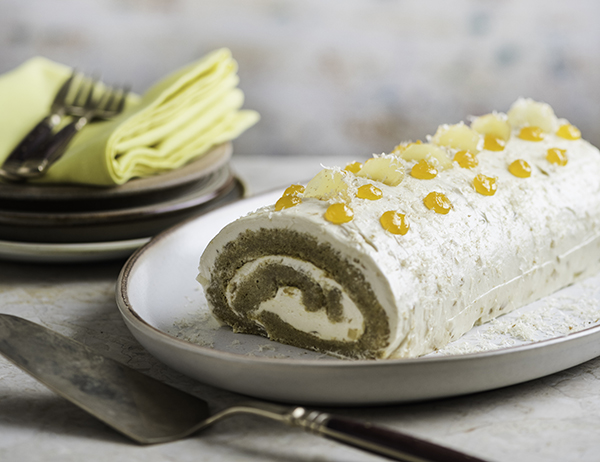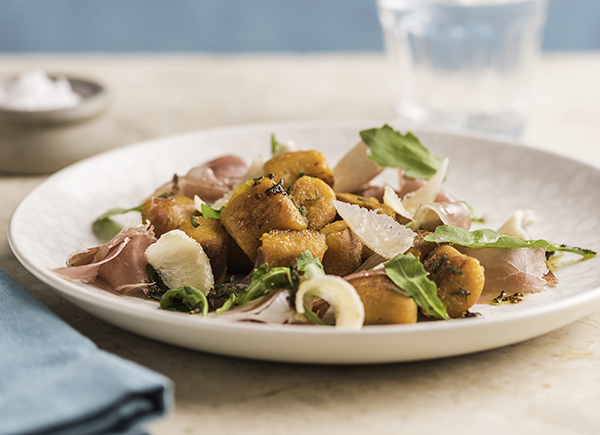Home-grown harvest: Winter squash
With a list of varieties as long and varied as their uses, the winter squash offers a bounty to chefs looking for a taste of the season. Russell Brown reports
The list of varieties is long and the names exotic, but there is real substance behind the style. Crown Prince, Delicata, Blue Hokkaido, Turban, Hubbard and Sweet Dumpling are just a few, and they all have different attributes, flavours and textures that make them truly versatile in the kitchen.
Squash in one form or another are available all year and are considered relatively easy to grow from seed. The main period for harvesting winter squash is September and October. Squash are technically a fruit and the winter varieties are harvested when the seeds have reached maturity and the skins have thickened. This will occur naturally outdoors in a reasonably dry autumn, but the fruit may need harvesting and moving to a dry, well-ventilated area if conditions are wet. Once cured, squash will keep at a cool room temperature without the need for refrigeration. All varieties are rich in carotenes and are high in vitamin A, C and B1 as well as being high in dietary fibre.
Lyburn Farm on the northern edge of the New Forest is one of several commercial growers in the UK and it lists Crown Prince, Hokkaido, Acorn, Gem and Harlequin as varieties they sell.
If you had to pick flavours that are often married with squash, chilli and sage would be high on the list. Italian and Asian-influenced dishes are extremely popular, and curries, laksa, pasta dishes and risottos are frequently found on menus but, as with the majority of ingredients, modern chefs are constantly pushing the boundaries. Jams, gels, mousses, terrines and gratins all appear.
Paul Berry, proprietor of the Swan Inn in Bampton, Devon, uses a dice of roasted squash and a purée for a risotto finished with deep-fried Brie and truffle oil; while Brett Sutton at the White Post in Rimpton on the Dorset/Somerset border, has a starter using cumin-roasted Crown Prince and butternut squash with Crown Prince bhajis, feta, pomegranate and a tandoori yogurt finished with pomegranate molasses.
How to roast squash
There are two main options when it comes to roasting squash. You can peel, deseed and dice the squash and then roast with a little oil, some seasoning and any desired flavourings. This generally gives a drier purée with a deeper, more toasted flavour.
The other method is to roast the squash whole and then skin and deseed it. The squash should be pierced with a skewer a few times to stop it bursting, and then roasted at 180ºC until completely tender. Once cooked and cool enough to handle, the flesh can be scooped out. This method gives a cleaner, purer flavour.
Market report
British winter squash is available now and will be available until around early/mid January.
Squash usually arrives in a 5kg box in a variety of colours, shapes and sizes. Each individual squash has a unique taste. Most growers add stickers to each squash with a sentence or two explaining where it is from and the taste to expect.
Squash will cost roughly £1.90 per kilo.
Ashley Clemencewww.totalproducelocal.co.uk
Buying and storage tips
•The beauty of winter squash is how long they will keep at a cool room temperature.
•The skins should be unbroken and feel hard. A thumbnail should leave only a slight mark on a properly cured squash.
•Squash should feel heavy for their size.
•Different varieties will keep for different times, with acorn and spaghetti squash keeping a couple of months and the butternut up to six.
Crown Prince, maple and ginger cake
Serves 8-10
For the cake 180g whole free-range eggs
75g maple syrup
75g light Muscovado sugar
150g squash purée from squash roasted whole
100g plain flour
3g fine salt
1tsp ground ginger
100g butter, melted and cooled
For the cream cheese filling 60g unsalted butter
85g maple syrup
300g cream cheese
25g stem ginger, diced
For the jam 10g squash purée from squash roasted whole
75g caster sugar
20ml lemon juice
In a stand mixer beat the eggs, syrup and sugar to form a thick sabayon. This will take around 10-15 minutes. Stir a third of the sabayon into the purée and then fold in the rest. Sift together the flour, salt and ground ginger and then fold into the sabayon mix. Finish by mixing in the melted butter.
Pour into a greased and lined baking tray measuring 43cm by 28cm and bake at 170ºC for 12-15 minutes.
Once cooked, sprinkle golden caster sugar over the surface, cover with a sheet of baking parchment and invert onto a board. Peel off the paper from the tin, trim the edges and roll up with the fresh sheet of parchment. Allow to cool.
For the filling, beat the butter until soft and fluffy, gradually add the maple syrup and then the cream cheese. Finish by folding in the diced ginger.
To make the jam, combine the ingredients in a small pan and bring to a simmer, stirring constantly. Continue to cook until a thick gel is achieved and then allow to cool.
To assemble, unroll the sponge and spread with a layer of the jam, reserving some for garnish. Then spread on half of the filling. Re-roll and then cover the roulade with the remainder of the frosting. Decorate with sliced ginger, the reserved jam and grated walnut.
Squash gnocchi with sage and prosciutto
Serves 5-6 as a main course
For the roasted squash 1kg onion squash, peeled, deseeded and diced
50ml olive oil
Maldon sea salt and freshly ground black pepper
4 sprigs sage
2 cloves garlic, smashed
For the gnocchi 400g roasted onion squash, cooked weight
100g plain flour
50g semolina
10g Maldon sea salt, finely ground
50g Parmesan, finely grated
2 free-range egg yolks
To serve (one portion) 25g unsalted butter
20ml olive oil
1tsp chopped sage
Lemon juice
2 slices prosciutto, torn into 2cm-3cm square pieces
Parmesan shavings
5g rocket
In a roasting tin, mix the squash with the seasoning and oil. Roast at 170ºC for 15 minutes. Add the sage and garlic and roast for a further 15 minutes or until the squash is completely tender and slightly charred on the edges. While still warm, remove the sage and push the squash and the garlic through a coarse sieve.
For the gnocchi, weigh out 400g of the roasted squash and place on the bench. Sift the flour, semolina and salt together and sprinkle half over the squash. Drizzle over the egg yolks and then sprinkle on the remaining flour mix and the Parmesan.
Use a metal dough scraper or a large kitchen knife, chop the mix together, repeatedly turning it over and then chopping again until the egg is reasonably well distributed. Take care not to overwork the mix. Once the mix is evenly blended, bring together by hand and knead very briefly. Divide the dough into four pieces and cover with cling film.
Working with one piece of dough at time, roll out into a sausage 1.5cm thick and cut into sections 1cm long. Roll each piece into a ball and then form on a gnocchi paddle or the back of a large fork. Alternatively, use the back of a dinner knife to cut the dough sausage into pillows.
To serve, heat the oil in a non-stick pan and add a portion of gnocchi. Fry until golden brown and cooked through, then add the butter and sage and continue to cook until the butter browns.
Add a little lemon juice and check the seasoning. Transfer to a shallow bowl, add the torn prosciutto, shave over some Parmesan and add some rocket.
Continue reading
You need to be a premium member to view this. Subscribe from just 99p per week.
Already subscribed? Log In












